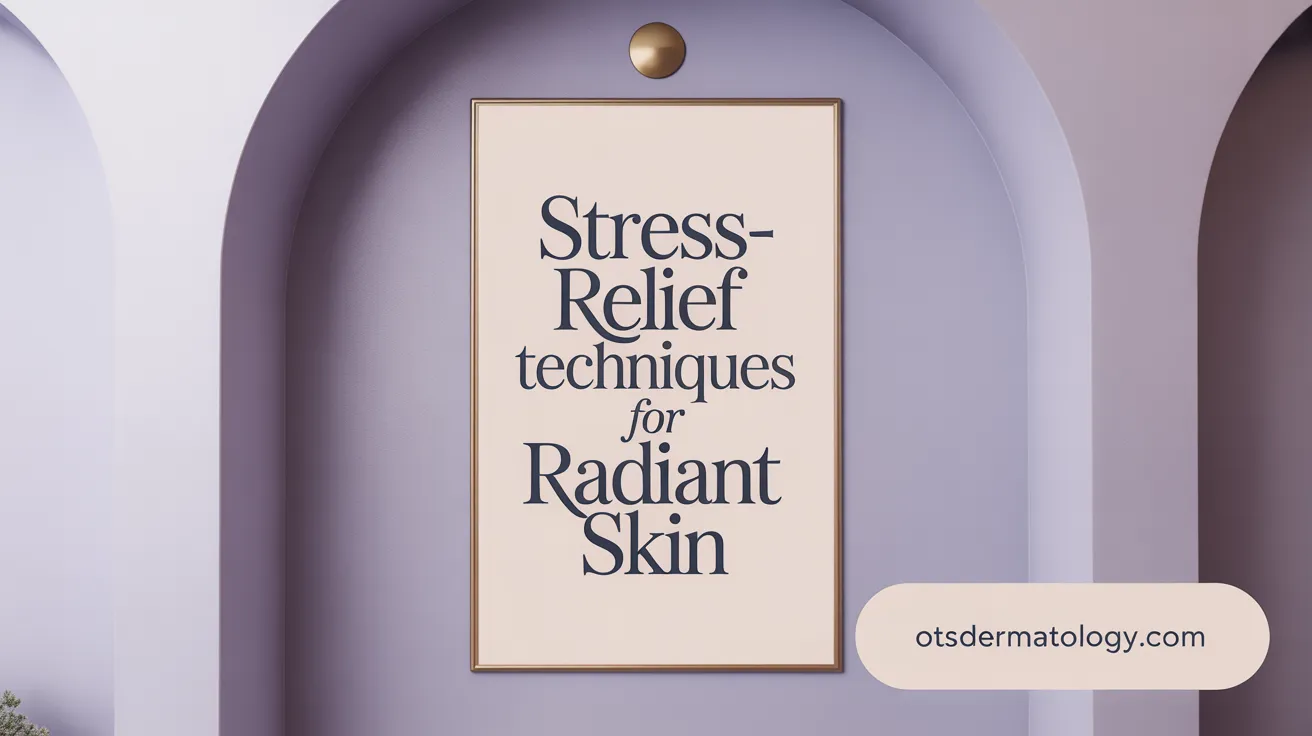The Emotional Connection Between Skin Health and Confidence
Emotional Benefits of Healthy Skin
Healthy skin plays a significant role in enhancing emotional well-being. When the skin is clear and well-maintained, individuals often experience increased feelings of confidence and self-assurance. This positive outlook can improve social interactions and overall quality of life.
Relationship Between Skin Appearance and Self-Esteem
The appearance of the skin is closely tied to self-esteem. Skin conditions such as acne, eczema, or psoriasis can lead to feelings of embarrassment or anxiety, negatively impacting self-image. Conversely, achieving and maintaining healthy skin can reduce these emotional burdens, fostering a more positive self-view.
Managing stress effectively is crucial, as stress hormones like cortisol can worsen skin inflammation and contribute to skin issues. Integrating stress-reduction practices, alongside consistent skincare and professional dermatology support, helps improve skin health and, in turn, supports emotional confidence.
Understanding the Stress-Skin Relationship

How Does the Stress Hormone Cortisol Affect the Skin?
When the body experiences stress, it releases cortisol, a hormone that plays a significant role in how the skin reacts. Elevated cortisol levels can increase inflammation, which may impair the skin's natural ability to heal wounds effectively. Additionally, cortisol causes the skin to produce more oil and sebum, contributing to clogged pores and potential breakouts. This hormonal response may also reduce the skin's resistance to infections, making it more vulnerable to irritants and pathogens. For more information, see Cortisol and skin inflammation.
What Is the Link Between Inflammation and Skin Conditions?
Increased inflammation caused by stress can worsen several skin conditions. Acne, eczema, psoriasis, rosacea, and hives often flare up when the body's inflammatory responses intensify. This heightened inflammation creates an environment that aggravates these chronic skin disorders, making their symptoms more severe and persistent. Learn more about the Effects of stress on acne and eczema.
How Does Stress Impact Skin Health Behaviors?
Stress not only affects the skin biologically but also influences behaviors that can harm skin health. Individuals under stress may touch or scratch their face more frequently, leading to irritation and potential infection. Additionally, stress can lead to neglect of daily skincare routines, worsening the condition of the skin over time. Maintaining consistent skincare and seeking professional dermatological care are important strategies to mitigate these effects during stressful periods. Explore Behavioral impacts on skin health and Professional dermatology care for guidance.
Common Skin Conditions Exacerbated by Stress

How Does Stress Worsen Common Skin Conditions?
Stress activates the body's release of cortisol, a hormone that increases inflammation and oil production in the skin. This hormonal surge can disrupt the skin's natural barrier, impair its ability to heal wounds, and reduce resistance to infections. These changes contribute significantly to the flare-ups and worsening of several skin conditions. For more information, see Stress and skin health.
Acne
Increased cortisol leads to higher sebum (oil) production, which can clog pores and encourage acne development. Stress also often causes behavioral reactions like face touching or picking, further aggravating acne. Learn more about the effects of stress on acne and eczema.
Eczema
Stress-induced inflammation can trigger eczema flare-ups. The skin becomes more sensitive and prone to dryness and irritation, making it harder to manage eczema symptoms. This is closely related to Cortisol and skin inflammation.
Psoriasis
Psoriasis is an inflammatory condition highly sensitive to stress. Elevated cortisol levels can exacerbate the immune system’s attack on skin cells, resulting in red, scaly patches becoming more pronounced. See also stress-induced skin conditions.
Rosacea
Stress can intensify rosacea symptoms by increasing skin inflammation and causing flushing. Patients may experience more frequent and severe episodes during stressful periods. Understanding behavioral impacts on skin health provides helpful insights.
Hives
Stress can prompt the release of histamines, which cause hives—raised, itchy welts on the skin. These can appear suddenly during emotional distress and may persist as stress continues. Managing stress and skin health is key.
Maintaining stress management techniques such as healthy eating, regular exercise, and relaxation practices, along with consistent skincare and dermatology consultations, can help protect and improve skin health during stressful times. For professional advice, consider managing stress for better skin, healthy habits for skin care, relaxation techniques and skin, and professional dermatology care from University of Utah Health dermatology.
Behavioral Factors Linking Stress and Skin Health

How Do Stress-Induced Behaviors Affect Skin Health?
Stress often leads to behaviors that can directly impact stress and skin health. One common response is increased touching or picking at the face, which can introduce bacteria, cause irritation, and worsen existing skin conditions such as effects of stress on acne and eczema or stress-induced skin conditions. For more information, see Stress-induced skin conditions.
What Role Does Neglecting Skincare Routines Play?
Periods of stress may result in neglecting daily skincare practices like cleansing, moisturizing, and sun protection. This neglect allows excess oils and dirt to build up, exacerbating inflammation and impeding the skin’s natural repair processes. Learn about healthy habits for skin care to prevent this.
What Are the Consequences of These Behavioral Responses?
Together, these behaviors can increase skin sensitivity, trigger flare-ups of chronic conditions, delay healing, and contribute to an overall decline in skin appearance and barrier function. Maintaining consistent skincare routines and consulting dermatologists when experiencing flare-ups can help mitigate these effects during stressful times. See Professional dermatology care and University of Utah Health dermatology for expert advice.
Strategies to Manage Stress for Better Skin

How does healthy eating support skin health under stress?
A balanced diet rich in antioxidants, vitamins, and minerals helps combat inflammation and supports the skin’s natural repair processes. Proper nutrition can strengthen the skin's barrier, reducing sensitivity and irritation caused by stress. For more on this, see Stress and skin health.
What role does hydration play in maintaining skin quality?
Drinking adequate water preserves skin hydration, reduces dullness, and helps flush out toxins. Hydrated skin is more resilient against damage and less prone to dryness and inflammation during stressful periods. Learn more about managing Behavioral impacts on skin health.
How can exercise benefit stressed skin?
Regular physical activity improves circulation, delivering oxygen and nutrients to the skin. It also reduces stress hormone levels like cortisol, helping to minimize inflammation and the exacerbation of conditions such as acne and eczema. See details on Effects of stress on acne and eczema.
Which relaxation techniques aid in skin health?
Practices such as deep breathing, meditation, yoga, and progressive muscle relaxation lower stress hormone levels. These techniques calm inflammatory responses in the skin, preventing flare-ups of psoriasis, rosacea, and other stress-sensitive conditions. Explore Relaxation techniques and skin for more information.
Why are social connections important for skin wellness?
Maintaining strong social interactions reduces stress and emotional distress, which can trigger skin problems. Emotional support promotes overall well-being, indirectly benefiting skin health. This ties into Managing stress for better skin.
How crucial is it to continue skincare routines during stress?
Stress can lead to neglecting skincare, worsening issues caused by increased oil production and inflammation. Consistent cleansing, moisturizing, and using dermatologist-recommended treatments maintain the skin’s integrity and help manage flare-ups. For expert advice, consult Professional dermatology care from University of Utah Health dermatology.
In summary, integrating stress management techniques like healthy eating, hydration, exercise, relaxation practices, social support, and diligent skincare routines can significantly improve skin health during challenging times. Consulting with dermatology professionals is also essential for tailored care.
The Role of Professional Dermatology Care in Emotional Well-being

Why is consultation with dermatologists valuable?
Consulting a dermatologist provides expert insight into managing skin conditions influenced by stress, such as acne, eczema, and psoriasis. Dermatologists can accurately diagnose and develop targeted treatment plans that address both the medical and cosmetic aspects of skin health. Learn more about stress and skin health.
What medical and cosmetic skin treatments are available?
Professional care includes a range of treatments like prescription medications to reduce inflammation, advanced wound healing therapies, and cosmetic procedures that improve the skin's appearance. These treatments help control flare-ups and promote healthier skin, addressing issues related to Cortisol and skin inflammation.
How does personalized care improve skin health?
A dermatologist tailors treatments based on individual skin type, condition severity, and lifestyle factors, ensuring effective management. Personalized plans often incorporate stress-induced skin conditions and managing stress for better skin strategies alongside skincare routines, enhancing overall skin resilience.
How does professional care support emotional confidence?
By improving skin appearance and mitigating the impact of stress-related flare-ups, professional dermatology care can boost a patient’s self-esteem and emotional well-being. Knowing they have specialist support from University of Utah Health dermatology helps patients maintain consistent care, promoting a positive cycle of physical and psychological health.
Embracing Healthy Skin as a Path to Emotional Wellness
The Benefits of Healthy Skin for Emotional Wellbeing
Maintaining healthy skin goes beyond appearance; it can significantly enhance emotional wellness. Healthy skin often reflects a well-balanced lifestyle and supports self-confidence, contributing to a positive self-image and reduced stress levels.
Why Professional Guidance Matters
Working with a dermatologist ensures personalized skin care tailored to individual needs, especially during stressful periods when skin can be more vulnerable. Professional advice can help manage conditions like acne, eczema, or psoriasis effectively while preventing further inflammation and irritation.
The Connection Between Skin Care and Emotional Rewards
Consistent skin care routines not only improve physical skin health but also foster positive emotional outcomes. The process of caring for one's skin encourages mindfulness and self-care, which are important for emotional balance. Healthy skin can boost confidence and promote a sense of control and wellbeing, reinforcing a cycle of emotional and physical health.
